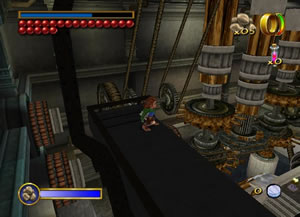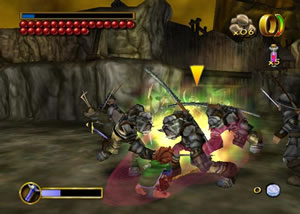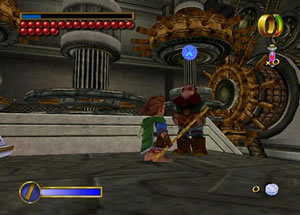More of a Peck than a Hobbit.
If EA’s The
Return of the King was a revelation in quality movie-to-video-game translation,
then Vivendi’s The Hobbit is a brain fart. Playing The
Hobbit is like talking to someone and realizing, in the midst of the
conversation, that they have been passing gas the whole time you’ve been talking
to them. You try to stay focused on the conversation – something about barking
spiders from Mars, maybe? – but you simply can’t continue. You nod politely,
say something about dropping some kids off at the pool, and turn off your console,
never to breathe another whiff of The Hobbit again.
Yes, The
Hobbit stinks. And while there are some great smelly things in the world
(my dog, for example), The Hobbit isn’t charming enough to be
considered one of them.
I spent a lot of time trying to like this game and stuck with it. But when
the entire episode involving Gollum was simply a short, narrated, un-playable
segment, I was awestruck. Even if the rest of The Hobbit had
been outstanding, the fact that you never interact with Gollum, that the
entire Gollum episode is less than a minute long, would still be driving me
crazy. To pass up on the opportunity to interactively realize one of the coolest
moments in literature (Riddles in the Dark), and instead opt for a drab little
cut-scene is unforgivable.
The only instance of pure creativity and senseless artistry to be found in The
Hobbit occurs right in the beginning of the game, outside of Bilbo’s
House. Amongst the flowers, nestled into the hillside is a willow – the most
beautiful tree I have ever seen in a video game. Its branches sway lightly in
the wind, the colors are fine and green and nuanced, and then these huge, tacky
butterflies swoop in, just to make sure you know that what you’re looking at
is beautiful. The developer’s tree guy is brilliant; everyone else should look
for new employment.
The Hobbit’s plot follows the novel closely enough that I’m
almost certain the game’s Creative Director, Chuck Lupher, knows someone who
has read The Hobbit, and perhaps even The Lord of the
Rings trilogy. From what must have been detailed interviews with that
person over a couple beers at a noisy bar, Chuck got the general plot and must
have decided that what he’d heard was good enough for a crappy platform/adventure
game. So, while the general “There And Back Again” plot is included,
it’s barely noticable.
Apparently, of greater importance are fighting and platforming. Combat in The
Hobbit is actually pretty cool. Bilbo gets Sting early on (it glows
all the time, not just when enemies are nearby) and fights like Link does in Zelda.
He can target a single enemy, leap towards, away from, or side-to-side, and auto-blocks
if he is backing away from his targeted adversary. However, Bilbo rarely fights
just one adversary, not to mention the fact that his movement speed is halved
when locked on to an opponent. So Bilbo is much better off chucking rocks at
enemies from a safe height (truly Hobbit-like, if you ask me) and running around
wildly with Sting ablaze.
Combat in The Hobbit is at its finest when Bilbo is fighting the tiny little frogmen. The frogmen are desperate and savage, yet small and impotent. In spite of their great fury they can’t significantly harm you, while with one lazy swing you can end several of their little lives. My favorite thing to do is to turn my back on them, as though I don’t notice the tiny, hopping men with frog heads. And so the bravest members of their clan rush forward to slay me, but right before they reach striking distance I whip around, lashing out with my blade and reducing them to… jewels?
Once the jewels have bounced happily into my pocket, nothing remains of what
was seconds before an entire tribe of frog men. Grandfathers, braves out for
their first hunt, proud, amphibian warriors – all gone. Their family jewels
jangle happily in my hobbit-sized pocket. Some people complain that games like Manhunt are
violent, but somehow I found this sort of toned-down “kiddy” violence
much more disturbing.
 However,
However,
the excitement of combat in The Hobbit wanes quickly, and after
a while I just wound up running around and past enemies. Several portions of The
Hobbit are what would be considered ‘Stealth
Oriented’ – orcs too powerful to vanquish roam around, and Bilbo must get from
here to there without being seen. Fortunately he has his ring, and can quickly
don it to slip from sight just before an enemy orc turns and sees him. However,
Bilbo can only wear the ring for a short time, and must sneak when wearing it
or the enemy will hear him. While such limits on the power of the ring aren’t
very Tolkienian, they are very common for stealth-sequences in video games. Unfortunately, The
Hobbit has nothing new to offer the stealth scene, but then, if the
developers had done anything new, it wouldn’t be so mediocre.
Graphically, The Hobbit begins wonderfully. Hobbiton is lush,
bright, and beautiful. There are scores of wonderful trees, bright flowers, and
an epic horizon that seems to promise an epic game to come. However, Hobbiton
and it’s tree prove to be the high point of the game and the visuals quickly
get darker and more repetitive. Bilbo looks terrible; his head sort of lags back
when he runs and is much too big for his body. He’s just as hairless, blocky
and polygonal as a Virtua
Fighter 1 character.
The music, though, is wonderful. The guitar tracks recorded for Hobbiton are
terrific. And then, in some marshes thick with spiders a wicked cello track
(which is somehow highly suggestive of spiders) kicks in. Same goes for the
general sound effects; when Bilbo climbs chains it sounds perfect. Unfortunately,
the voice acting is bad.
Finally (because I almost forgot about them) there is the matter of The
Hobbit‘s
puzzles. Most of these involve treasure chests with timing-based mini-games
instead of locks. Screw up and you might get burned or poisoned (and reeeally
frustrated). There are also some wonderful puzzles where you have to find all
the gears and bolts needed to repair a gate. I think at one point there are
three of these in a row, and they’re identical.
Sweeet.
Oddly, I can’t think of any reason to recommend The Hobbit to
anybody. It straddles the line between little kid game and hard platformer in
such a way that I don’t think anyone will like it. I guess The Hobbit makes
these strange concessions to gameplay to make it a friendlier game, but it’s
still frustrating as hell. And the game screws around with important literary
details enough to turn off Tolkien fans (like myself). So, I guess if slaughtering
scores of poor innocent frogmen sounds fun, The Hobbit might be the game for
you, for an hour or two.

-
Some awesome trees
-
Wonderful music
-
Annoying platforming
-
Mundane puzzles
-
Straight off a conveyor belt







